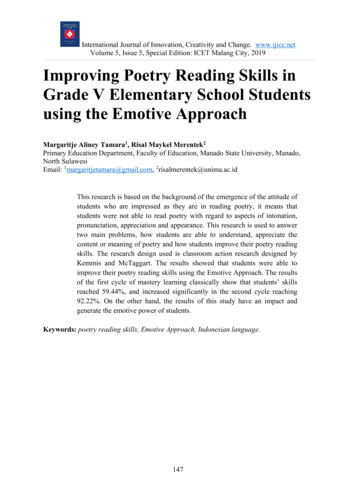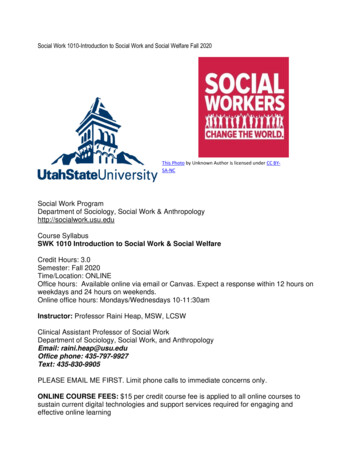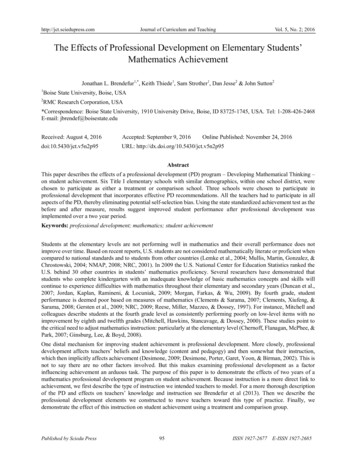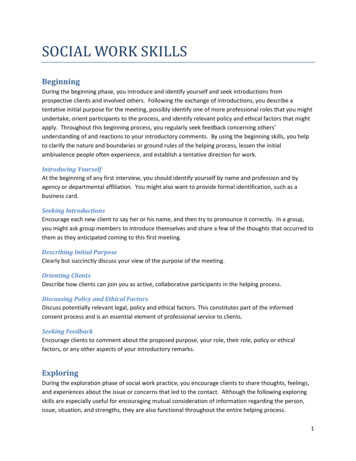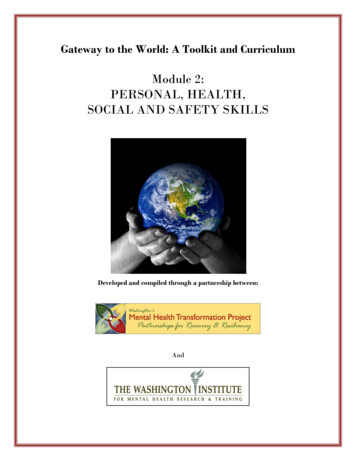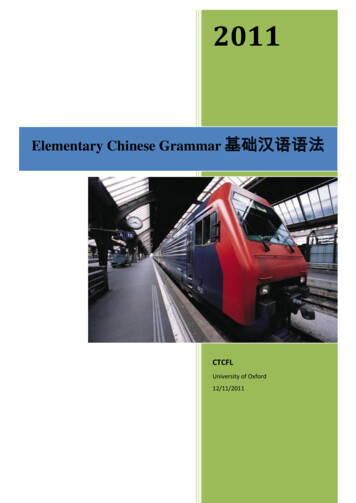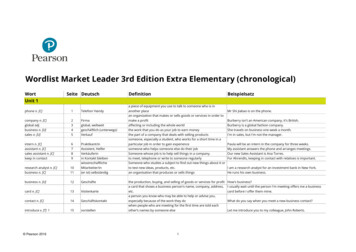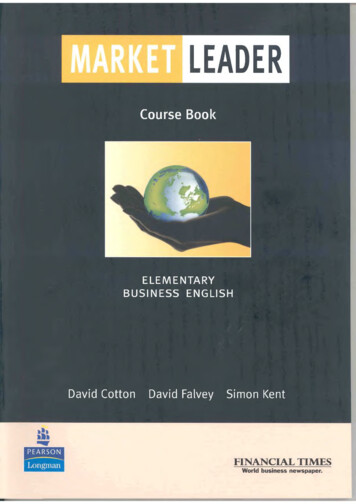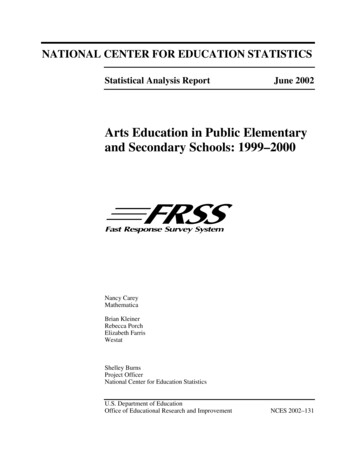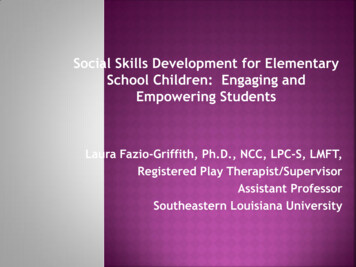
Transcription
Social Skills Development for ElementarySchool Children: Engaging andEmpowering StudentsLaura Fazio-Griffith, Ph.D., NCC, LPC-S, LMFT,Registered Play Therapist/SupervisorAssistant ProfessorSoutheastern Louisiana University
Children’s play is not mere sport. It is full ofmeaning and import.F. FrobelBirds fly, Fish swim, and Children play.Garry Landreth
FeelingsBehaviorsThoughts
Skills: InterpersonalcommunicationSelf RegulatoryAppreciation forDiversityFlexibilityProblem Solving &Critical Thinking
Issues in School Settings Grief/Loss Fears Anxiety ADHD Bullying Behavior AngerManagement Trauma SOCIAL SKILLS
What are Social Skills? Accordingto Combs and Slaby (1977), “theability to interact with others in a givensocial context in specific ways that aresocially acceptable or valued and at thesame time personally beneficial, mutuallybeneficial, or beneficial primarily to others”(p. 162).
What Does This Mean? Generally,social skills are defined as sociallyacceptable learned behaviors that enablechildren in a school environment to interactwith their peers and teachers in a way thatelicit positive response responses and assistin avoiding negative responses as a result ofthese interactions.
Top 10 Skills Needed to Succeed inElementary School 1.2.3.4.5.6.7.8.9.10.Listen to others.Follow the steps.Follow the rules.Ignore distractions.Ask for help.Take turns when you talk.Get along with others.Stay calm with others.Be responsible for your behavior.Do nice things for others. Elliott and Gresham (2007)
What is the Difference Between aSkill Deficit and a PerformanceDeficit? SkillDeficit: A student cannot perform theskill. PerformanceDeficit: A student won’tperform the skill consistently.
Selecting Specific Social Skills forElementary School Children ClassroomSurvival Skills Friendship Making Skills Dealing with Feelings Skill Alternatives to Aggression Skills for Dealing with Stress
Methods for Implementing SocialSkills Development in ElementarySchools SocialSkills Groups Cognitive-Behavioral Play Therapy (CBPT)
Social Skills Groups Smallgroups or guidance lessons have beenproven to be most effective in developingsocial skills. ASCA (2012) has endorsed group work as animportant component in a comprehensiveschool counseling program A small group counseling intervention canstrengthen the development of social skillsand promote school counselor visibility andimprove school counselor relationships withparents, teachers, and other stake holders(Kayler and Sherman, 2009)
Cognitive-Behavioral Play Therapy Allchildren could profit or benefit fromengaging in play therapy as an opportunity toexercise social skills within a controlledsetting ( Gould as cited in Landreth, (2001). CBPT Developed by Susan Knell Integrates ideas from behavior therapy,cognitive therapy, and cognitive-behavioraltherapy Play activities, verbal and nonverbal forms ofcommunication are used to resolve problems.
Six Tenets of CBPT CBPT involves the child in treatment via play.CBPT focuses on the child’s thoughts, feelings,fantasies, and environment.CBPT provides a strategy or strategies fordeveloping more adaptive thoughts and behaviors.CBPT is structured, directive, and goal-oriented,rather than open-ended.CBPT incorporates empirically demonstratedtechniques such as modeling, and role playing.CBPT allows for empirical evaluation of treatmentwhich can enhance the involvement of parents andstakeholders in the school environment (p. 44-45).
CBPT Techniques Modeling BehavioralRehearsal Behavioral Contingencies Coping Self-Statements Bibliotherapy
A School Based Social Skills Group:Engaging and Empowering Students Purpose of the group:Assist the students in developing a positive selfimage, expressing their feelings, dealing withstress, and making friends8 SessionsApproximately 30-40 minute sessionsMixed gender and grade levels depending on skilldeficits
Social Skills Group Session 1 Develop rapport and build trustGroup rulesSchool counselor introduces the skill: Selfintroductions and building relationships within thegroup (friendship)Each group member selects a crayon and takes apiece of white paper. The school counselor instructsthe group to read the color on the crayon. “ If youwere this color, how would you describe yourself?Please write words on your paper that describe howyou are similar to the color crayon you selected.”Modeling Technique
Social Skills Group Session 2 Checkin: One thing that was positive aboutyour week was. Introduction of the Skill: learning how toidentify and express feelings. Technique: Feeling Charades
Social Skills Group Session 3 Introductionof the Skill: Making appropriatechoices and handling our own problems. Creating stories and choosing your ownendings. Technique: Puppets Behavioral Rehearsal Behavioral Contingencies
Social Skills Group Session 4 Reviewof previous skills Reminder of remaining sessions Introduction of the skill: Help the studentsreplace negative self-defeating behaviors Technique: Collages
Social Skills Group Session 5 Introductionof the skill: Stress Management Focus on the positive instead of the negativestressor Activity: Draw your World Check out: Asking each group member tostate which stress technique works best forthem. Behavioral Contingencies: Giving eachmember a coupon to check out an extra bookat the library that week.
Social Skills Group Session 6 Remindstudents only 2 groups left Introduce the skill: Building self-esteem bycreating a positive self-image. Self-Perception Activity Close the group by having members shareone thought about their self perception thatwould help them have a positive interactionat recess Behavioral Rehearsal
Social Skills Group Session 7 Discussionof how to end the group andcelebrate the work the members have donecollectively and individually. Introduce the skill: Expressing anger in anappropriate way Technique: Anger Box Reading the book: “When Sophie Gets AngryReally, Really, Angry” Bibliotherapy
Social Skills Group Session 8 Introductionof final skill: interpersonalrelationships and saying goodbye. Appreciation Booklets Closure of the group by asking each groupmember to reflect upon one skill that theyhad learned and utilized in the classroom oron the playground.
Follow Up Threeweeks after the completion of thegroup Teachers should complete some type of postcheck list Comparison of the results to see if socialskills have improved Continued work with the teachers
Bibliotherapy Resources for Social SkillsDevelopment . Double-Dip Feelings: A Book to Help Children Understand Emotions byBarbara Cain 1990. Grades K-4.I Like Me by Nancy Carlson 1988. Grades K-4.When Sophie Gets Angry--- Really, Really Angry by Molly Bang 1996. GradesK-4.I’m Gonna like Me: Letting off a Little Self-Esteem by Jamie Lee Curtis.Illus. by Laura Cornell 1998. Grades K-3.Today I Feel Silly & Other Moods That Make My Day by Jamie Lee Curtis.Illus. by Laura Cornell 1998. Grades K-3.Where Do Balloons Go? An Uplifting Mystery by Jamie Lee Curtis.Illus. by Laura Cornell 1998. Grades K-3.Whoever You Are by Mem Fox. Illus by Leslie Staub 1997. Grades K-5.Go Away, Big Green Monster! by Ed Emberley 1992. Grades K-2.Hands Are Not For Hitting by Martine Agassi. Illus. by Marieka Heinlen 2006.Grades K-2.Words Are Not For Hurting by Elizabeth Verdick Illus. by Marieka Heinlen2003. Grades K-3.Alexander and the Terrible, Horrible, No Good, Very Bad Day by JudithViorst.Illus. by Ray Cruz 1972. Grades K-5
Questions
Social Skills Groups Small groups or guidance lessons have been proven to be most effective in developing social skills. ASCA (2012) has endorsed group work as an important component in a comprehensive school counseling program A small group counseling intervention can str
